Wife begged for husband's help to die, he could do nothing
SIX weeks of pure hell. That's the only way Terry Gladman could describe the final weeks with his wife Helen as she lost her cancer battle. Now he wants action.

Coffs Harbour
Don't miss out on the headlines from Coffs Harbour. Followed categories will be added to My News.
SIX weeks of pure hell.
That's the only way Terry Gladman could describe the final weeks with his wife Helen as she lost her battle with cancer.
Having been together for 30 years, he said it always seemed like there was nothing they couldn't get through together, but when she begged him to make the pain stop, there was nothing he could do.
Mr Gladman attended his first Dying With Dignity meeting recently and shared his story.
He said what Helen thought was muscular pain was stage four terminal lung cancer and nearly 13 months later, she passed away.
Mr Gladman said "it's an ugly way to die and it's unnecessary".
"She had a 70mm x 40mm x as big-as-my-fist tumour in her lung, they couldn't operator on it, it was up against her oesophagus," he said.
"... She's a very strong person, I met her when she was 22 and she had two little boys and the deal was it was the three of them or nothing, so that gives you an insight to what she's like."
He said after months of being in and out of hospital, the amount of drugs, "if she hadn't been in pain would have killed anyone basically".
"So after two weeks we had a meeting with the doctors and two sons, the prognosis was they couldn't do anything else for her, she would be just as sick if they tried to make her better with chemo, so she decided that she'd have pain management and no more treatment."
Mr Gladman said there were ups and downs, but the pain she was in had her begging him to make it stop.
"... She was begging me to make the pain go away and make it stop - this was a woman who rode endurance horses, travelled all over eastern Australia with me on the motorbikes, travelled through Europe on motorbikes, did all sorts of stuff.
"And she was begging me to help her die and I couldn't do anything.

"The sitting there watching her go from a vibrant, determined, take-no-s--t-from-anyone woman to a shell, in agony, not being about to breathe properly and dying of thirst is the worst thing I have ever seen, or had to do."
Mr Gladman said the palliative care team, oncology and everyone in Bundaberg was absolutely fantastic.
"The hardest part is watching someone you love just fading away and you can't stop it, it's a horrible death, there's no dignity, there's no peace," he said.
He said they were lucky in the fact that they had a year to get their affairs in order.
"We discussed it, as I said we rode motorcycles, I still do, and we've always told our children if we come off and have an accident and either of us are paraplegic or braindead they are to turn the machines off," Mr Gladman said.
He said he didn't want anyone else to go through what is wife had.
"... If the person's directives are there and it's written up legally binding and they've said 'this is what I want to happen' there should be no impediment from government, church or anyone else to stop it happening," Mr Gladman said.
He said it's wrong to prolong life when there's no quality or dignity - "there is no dignity in suffering".
"I suppose I take a realistic approach to life, some things you can change, some you can't," he said.
"Hopefully we can change this."
Mr Gladman said he and Helen's sister were going to finish his wife's bucket list later this year, starting with the likes of London, Rome and Vienna.
To make a submission to the inquiry into aged care, end-of-life and palliative care and voluntary assisted dying, it needs to be done before April 15.
For more information on the inquiry or how to make a submission, visit https://bit.ly/2DPhsDI.
Originally published as Wife begged for husband's help to die, he could do nothing


